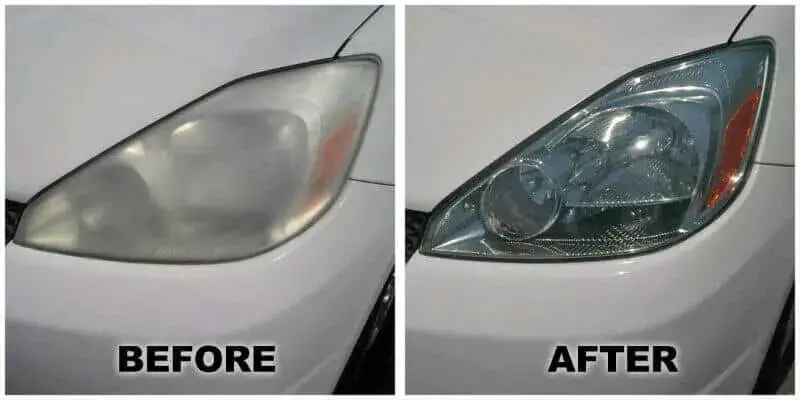 We will now examine the reasons behind foggy headlights and discuss the proper method for cleaning headlight lenses when needed.
We will now examine the reasons behind foggy headlights and discuss the proper method for cleaning headlight lenses when needed.
What do foggy headlights indicate?
If you observe that the brightness of the light coming from your headlights has significantly decreased, it is likely that your vehicle is experiencing foggy headlights. In some cases, drivers may also notice that not only are their headlights less bright, but the light also appears to have a yellowish, dull hue. This discoloration is also a result of headlight fogging. The cause of headlight fogging is somewhat scientific in nature. Nowadays, most headlight lenses are constructed from a thick plastic material known as polycarbonates. Unlike the glass lenses found in older vehicles, these plastic lenses are more resistant to scratches and are more durable. However, as time passes and the polycarbonate plastic is exposed to UV rays from the sun, the outer layers start to deteriorate and degrade. These changes lead to the lenses absorbing blue light from the bulbs, resulting in a less intense, yellowish light being emitted. Fortunately, cleaning foggy headlights is a relatively simple task.
Different ways to clean headlights require different products
Auto supply stores typically carry specific products for cleaning fogged-up headlight lenses caused by UV exposure. These products, labeled as "headlight restoration kits" or "headlight lens restoration," are readily available and offer a straightforward solution for cleaning your vehicle's foggy headlights. However, if you find yourself in a situation where you need to clean foggy headlights immediately, there are a few alternative options that can also do the job effectively. Toothpaste and baking soda, both mildly abrasive, can be used as cleansers without causing any scratches or damage to the headlights. Additionally, polishing compounds like Rain-X may prove effective in addressing UV damage. It is generally advisable to have a cleaning kit on hand in your garage or home for such situations.
A guide on restoring foggy headlights to their original clarity
You do not require an abundance of supplies to clean the headlights on your vehicle.
Below are some essential items you may need:
- Headlight cleaning kit, baking soda, or toothpaste
- Used rags or towels
- Latex gloves for those with sensitive skin
- Water for rinsing
- Soft-bristled brush
- Gentle cleanser
Now, let us examine the necessary steps to effectively clean foggy headlights.
1. REMOVE DEBRIS FROM THE SURFACE
Ensure that the surface is free from any debris before starting the restoration process. Use a mild cleanser to spritz the headlights and gently remove any dirt, particles, dead bugs, or grime that may be present on the surface.
2. DRY WITH A TOWEL
After cleaning, use a dry towel or rag to wipe down the surface until it is completely dry.
3. APPLY THE HEADLIGHT RESTORER
Apply a generous amount of the cleanser - whether it's from a headlight restoration kit, toothpaste, or baking soda - onto the headlight lenses. If using baking soda, make sure to mix it with a small amount of water to create a thick paste. Allow the cleanser to sit on the lens for a few minutes.
4. USE A BRUSH TO REMOVE THE CLEANSER
Gently use circular motions with a brush to work the cleanser around the headlight surface. Be cautious as the cleanser is abrasive, so avoid causing any damage to the plastic surface. You should start to see the yellowing or fogging disappear as you clean.
5. WIPE OFF EXCESS CLEANSER
Buff away any remaining cleanser from the lens using a clean rag or towel. For any stubborn spots, spray clean water and then polish dry with the towel. By following these steps, you will achieve clearer and brighter headlights, resulting in improved visibility while driving.
Let us know in the comments below if this guide helped you.